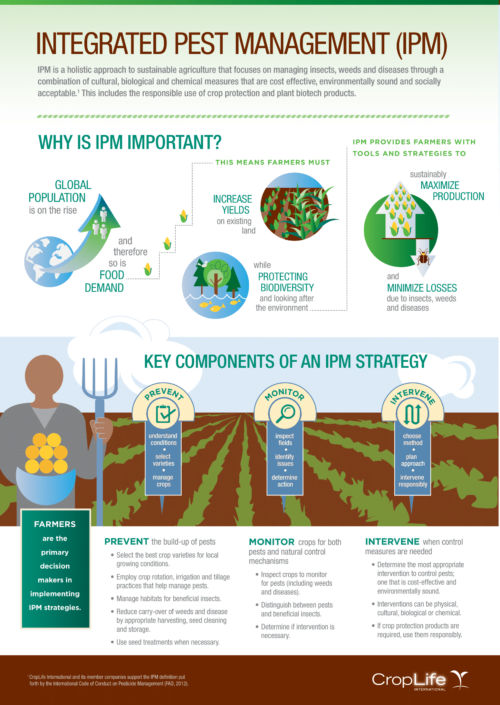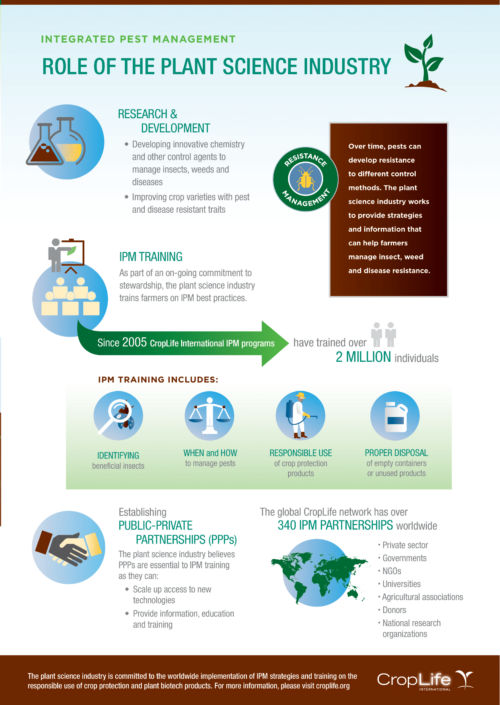Stewardship promotes good agricultural practice buildings on what farmers know of their land and agricultural systems and augmenting this with additional knowledge and support in its application. Pesticides used with good agricultural practices provide many benefits to farmers beyond increasing crop production and reliability of food supply.
Stewardship Strategy 2025: Progress to Date
| Key Performance Indicator | Description | 2019 Baseline | 2025 Target | 2023 Progress |
| Responsible use of pesticides by smallholder farmers | Double number of farmers trained annually by CLI member companies and global CropLife network. Farmers to be trained IPM and responsible use, mainly in Africa, Asia, and Latin America. | 10 million per year | 20 million per year | 20.5 million |
| Pest resistance management | Promote and implement mandatory mode of action labelling. | 12 countries | 25 countries | 18 countries (8 committed) |
| Collection and disposal of pesticide waste | Increase annual pesticide container collection rates by 20%, focusing on China and India.
Inventory, safeguard, and destroy obsolete pesticides and prevent new buildup. |
95,000 tonnes
6,500 tonnes |
114,000 tonnes
2,000 additional tonnes |
144,000 tonnes
8,200 tonnes |
Integrated Pest Management
Integrated Pest Management, or IPM, is a system of managing pests using the best combination of cultural, agronomic, biological, genetic, and chemical measures available and appropriate in a given environment. This provides the most cost effective, environmentally-sound, reliable and socially acceptable method of managing diseases, insects, weeds, and other pests.
IPM is implemented with an understanding of the ecology of the field, what species are present, how they interact, and the risk they pose to the crop. When action is required, farmers will consider all available methods and tools for pest management. Elements that can be included in an IPM program are summarized in the figure below. Every year CropLife International and its member companies train millions of farmers in IPM.
Resistance Management
Successful pest management tools increase the evolutionary selection pressure on the pest. Evolution can lead to a reduction in the efficacy of the crop protection tool, which has subsequent impacts on farm productivity, reliability of production, and, if occurring at a national level, GDP.
Pest resistance is managed by reducing the selection pressure on life cycles of the pest through the judicious use of genuine registered products, implementation of IPM, and using the Mode of Action classification. This is explained in animations for fungicide, insecticides, and herbicide.
Resistance Action Committees conduct research and agreeing classifications to help to manage the risks of pest resistance to fungicides, herbicides, insecticides, and rodenticides.
- Fungicide Resistance Action Committee (FRAC)
- Insecticide Resistance Action Committee (IRAC)
- Herbicide Resistance Action Committee (HRAC)
- Rodenticide Resistance Action Committee (RRAC)
Similar to all stewardship programs, resistance management practices require a diversity of tools that must evolve and be flexible. Local agricultural conditions will help define what types of resistance management programs are needed, and they must be continuously reviewed and reconsidered.
Responsible Use
Genuine registered pesticides include guidance on their labels as to how the product should be used responsibly. When pesticides are used responsibly, the risks associated with their use are mitigated. Preventing risks through good practice is the focus of responsible use training. The product label provides guidance on the use of the correct Personal Protection Equipment (PPE), while guidance for personal protection when handling and applying pesticides is also provided through the International Code of Conduct on Pesticide Management.
CropLife International and its member companies are committed to promoting practices that encourage the responsible, safe, and efficient use of its products. This is undertaken within the context of promoting an Integrated Pest Management (IPM) strategy, and forms an important part of the industry’s life-cycle approach to product stewardship.
Container Management
For more than 30 years CropLife International member companies have been at the vanguard of agricultural plastic management through establishment of empty pesticide container management systems (CMS) to ensure return, collection, and responsible end of life waste management. Such CMSs have now been established in 60 countries across the globe.
The goals of the CMS include protecting both the environment and the operator from exposure; ensuring appropriate handling and safe disposal of used packaging, reducing waste, and maximizing recycling. Recycling rates continue to rise, and the experience of these CMS are used to further grow the network in number and plastics collected.
CropLife International develops guidance and advice for establishing, maintaining, and strengthening cost-effective, sustainable container management systems. The crop protection industry’s goal, by 2025, is to continuously improve the farmer return rate, and the number of countries with container management programs, collecting by weight 20% more plastic containers than in 2019, recycling as much as feasible into end-use applications. A road map describing how to establish a container management program is available here, and materials supporting increases in collection rates are available here.
Container Management Systems Around the World
Container management country programs include Australia, Austria, Argentina, Belgium, Bolivia, Brazil, Canada, Chile, Colombia, Costa Rica, Croatia, Dominican Republic, Ecuador, El Salvador, France, Germany, Guatemala, Honduras, Hungary, Luxembourg, Mexico, Netherlands, New Zealand, Nicaragua, Panama, Paraguay, Peru, Poland, Portugal, Romania, Slovenia, South Africa, Spain, United States, and Uruguay.
Field Trial Compliance
As part of the industry’s initiatives to support responsible stewardship, CropLife International developed a Compliance Management for Confined Field Trials manual, which is a resource for those conducting confined field trials of biotech-derived crops, as well as developing quality management programs. This document has been the basis for Compliance Management for Confined Field Trial Workshops conducted around the world.
To date, these workshops have been held in China, India, Malawi, the Philippines, South Africa, and Vietnam. Participants in these workshops include government officials and representatives from public and private research groups. The objective is to help ensure uniform compliance with the terms and conditions of authorization for confined field trials, as well as to demonstrate responsible user and/or developer management of confined field trials. These workshops are especially useful in countries that lack a national biosafety framework by providing a model around which biosafety guidelines can be developed.

